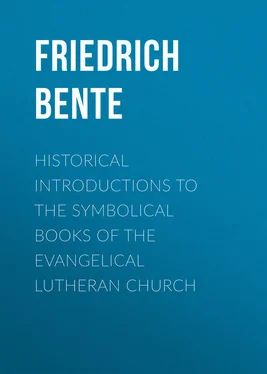Friedrich Bente - Historical Introductions to the Symbolical Books of the Evangelical Lutheran Church
Здесь есть возможность читать онлайн «Friedrich Bente - Historical Introductions to the Symbolical Books of the Evangelical Lutheran Church» — ознакомительный отрывок электронной книги совершенно бесплатно, а после прочтения отрывка купить полную версию. В некоторых случаях можно слушать аудио, скачать через торрент в формате fb2 и присутствует краткое содержание. ISBN: , Жанр: foreign_antique, foreign_prose, на английском языке. Описание произведения, (предисловие) а так же отзывы посетителей доступны на портале библиотеки ЛибКат.
- Название:Historical Introductions to the Symbolical Books of the Evangelical Lutheran Church
- Автор:
- Жанр:
- Год:неизвестен
- ISBN:http://www.gutenberg.org/ebooks/26909
- Рейтинг книги:3 / 5. Голосов: 1
-
Избранное:Добавить в избранное
- Отзывы:
-
Ваша оценка:
- 60
- 1
- 2
- 3
- 4
- 5
Historical Introductions to the Symbolical Books of the Evangelical Lutheran Church: краткое содержание, описание и аннотация
Предлагаем к чтению аннотацию, описание, краткое содержание или предисловие (зависит от того, что написал сам автор книги «Historical Introductions to the Symbolical Books of the Evangelical Lutheran Church»). Если вы не нашли необходимую информацию о книге — напишите в комментариях, мы постараемся отыскать её.
Historical Introductions to the Symbolical Books of the Evangelical Lutheran Church — читать онлайн ознакомительный отрывок
Ниже представлен текст книги, разбитый по страницам. Система сохранения места последней прочитанной страницы, позволяет с удобством читать онлайн бесплатно книгу «Historical Introductions to the Symbolical Books of the Evangelical Lutheran Church», без необходимости каждый раз заново искать на чём Вы остановились. Поставьте закладку, и сможете в любой момент перейти на страницу, на которой закончили чтение.
Интервал:
Закладка:
The text of the Smalcald Articles, as published by Luther, omits the following motto found in the original: "This is sufficient doctrine for eternal life. As to the political and economic affairs, there are enough laws to trouble us, so that there is no need of inventing further troubles much more burdensome. Sufficient unto the day is the evil thereof. His satis est doctrinae pro vita aeterna. Ceterum in politia et oeconomia satis est legum, quibus vexamur, ut non sit opus praeter has molestias fingere alias quam miserrimas [necessarias]. Sufficit diei malitia sua. " (Luther, Weimar 50, 192. St. L. 16 1918.) Apart from all kinds of minor corrections, Luther added to the text a Preface (written 1538) and several additions, some of them quite long, which, however, did not change the sense. Among these are sec. 5, secs. 13 to 15, and secs. 25-28 of the article concerning the Mass; secs. 42-45 concerning the False Repentance of the Papists; secs. 3-13 about Enthusiasm in the article concerning Confession. The editions of 1543 and 1545 contained further emendations. The German text of Luther's first edition of 1538 was received into the Book of Concord, "as they were first framed and printed." (853, 7.) The first Latin translation by Peter Generanus appeared in 1541, with a Preface by Veit Amerbach (later on Catholic Professor of Philosophy at Ingolstadt). In 1542 it was succeeded by an emended edition. In the following year the Elector desired a Latin-German edition in octavo. The Latin translation found in the Book of Concord of 1580 was furnished by Selneccer; this was revised for the official Latin Concordia of 1584.
78. Tract on the Power and Primacy of the Pope
Melanchthon's "Tract Concerning the Power and Primacy of the Pope, Tractatus de Potestate et Primatu Papae, " presents essentially the same thoughts Luther had already discussed in his article "Of the Papacy." Melanchthon here abandons the idea of a papal supremacy iure humano, which he had advocated at Augsburg 1530 and expressed in his subscription to Luther's articles, and moves entirely in the wake of Luther and in the trend of the Reformer's thoughts. The Tract was written not so much from his own conviction as from that of Luther and in accommodation to the antipapal sentiment which, to his grief, became increasingly dominant at Smalcald. ( C. R. 3, 270. 292f. 297.) In a letter to Jonas, February 23, he remarks, indicating his accommodation to the public opinion prevailing at Smalcald: "I have written this [Tract] somewhat sharper than I am wont to do." (271. 292.) Melanchthon always trimmed his sails according to the wind; and at Smalcald a decidedly antipapal gale was blowing. He complains that he found no one there who assented to his opinion that the papal invitation to a council ought not be declined. (293.) It is also possible that he heard of the Elector's criticism of his qualified subscription to Luther's articles. At all events, the Tract amounts to a retraction of his stricture on Luther's view of the Papacy. In every respect, Smalcald spelled a defeat for Melanchthon. His policy toward the South Germans was actually repudiated by the numerous and enthusiastic subscriptions to Luther's articles, foreshadowing, as it were, the final historical outcome, when Philippism was definitely defeated in the Formula of Concord. And his own Tract gave the coup de grace to his mediating policy with regard to the Romanists. For here Melanchthon, in the manner of Luther, opposes and denounces the Pope as the Antichrist, the protector of ungodly doctrine and customs, and the persecutor of the true confessors of Christ, from whom one must separate. The second part of the Tract, "Concerning the Power and the Jurisdiction of the Bishops, De Potestate et Iurisdictione Episcoporum, " strikes an equally decided note.
The Tract, which was already completed by February 17, received the approval of the estates, and, together with the Augustana and the Apology, was signed by the theologians upon order of the princes. ( C. R. 3, 286.) Koellner writes: "Immediately at the convention Veit Dietrich translated this writing [the Tract] into German, and (as appears from the fact that the Weimar theologians in 1553 published the document from the archives with the subscriptions) this German translation was, at the convention, presented to, and approved by, the estates as the official text, and subscribed by the theologians." (464.) Brenz's letter appended to the subscriptions shows that the signing did not take place till after February 23, perhaps the 25th of February. For on the 26th Melanchthon and Spalatin refer to it as finished.
With reference to the Concord of 1536, let it be stated here that, although mentioned with approval by the theologians and also included in Brenz's and Melander's subscriptions to the Smalcald Articles, the princes and estates nevertheless passed no resolution requiring its subscription. Melanchthon writes that the princes had expressly declared that they would abide by the Wittenberg Concord. ( C. R. 3, 292.) Veit Dietrich's remark to Foerster, May 16, 1537, that only the Augustana and the Concord were signed at Smalcald, is probably due to a mistake in writing. (372.)
79. Authorship of Tract
The Tract first appeared in print in 1540. A German translation, published 1541, designates it as "drawn up by Mr. Philip Melanchthon and done into German by Veit Dietrich." ( C. R. 23 722.) In the edition of the Smalcald Articles by Stolz and Aurifaber, 1553, the Tract is appended with the caption: "Concerning the Power and Supremacy of the Pope, Composed by the Scholars. Smalcald, 1537." In the Jena edition of Luther's Works the Smalcald Articles are likewise followed by the Tract with the title: "Concerning the Power and Supremacy of the Pope, Composed by the Scholars in the Year 37 at Smalcald and Printed in the Year 38." (6, 523.) This superscription gave rise to the opinion that the German was the original text. At any rate, such seems to have been the belief of Selneccer, since he incorporated a Latin translation, based on the German text, into the Latin edition of his Book of Concord, privately published 1580. Apart from other errors this Latin version contained also the offensive misprint referred to in our article on the Book of Concord. In the official edition of 1584 it was supplanted by the original text of Melanchthon. The subtitle, however, remained: "Tractatus per Theologos Smalcaldicos Congregatos Conscriptus."
To-day it is generally assumed that by 1553 it was universally forgotten both that Melanchthon was the author of the Tract, and that it was originally composed in Latin. However, it remains a mystery how this should have been possible – only twelve years after Dietrich had published the Tract under a title which clearly designates Melanchthon as its author, and states that the German text is a translation. The evidence for Melanchthon's authorship which thus became necessary was furnished by J. C. Bertram in 1770. However, before him Chytraeus and Seckendorf, in 1564, had expressly vindicated Melanchthon's authorship. Be it mentioned as a curiosity that the Papist Lud. Jac. a St. Carolo mentioned a certain "Articulus Alsmalcaldicus, Germanus, Lutheranus" as the author of the Tract. In the Formula of Concord and in the Preface to the Book of Concord the Tract is not enumerated as a separate confessional writing, but is treated as an appendix to the Smalcald Articles.
80. A Threefold Criticism
On the basis of the facts stated in the preceding paragraphs, Kolde, followed by others believes himself justified in offering a threefold criticism. In the first place, he opines that Luther's Articles are "very improperly called 'Smalcald Articles.'" However, even if Luther's Articles were not officially adopted by the Smalcald League as such, they were nevertheless, written for the Convention of Smalcald, and were there signed by the assembled Lutheran theologians and preachers and privately adopted also by most of the princes and estates. For Luther's Articles then, there is and can be no title more appropriate than "Smalcald Articles." Tschackert remarks: "Almost all [all, with the exception of the suspected theologians] subscribed and thereby they became weighty and important for the Evangelical churches of Germany; and hence it certainly is not inappropriate to call them 'Smalcald Articles,' even though they were written at Wittenberg and were not publicly deliberated upon at Smalcald." (302.)
Читать дальшеИнтервал:
Закладка:
Похожие книги на «Historical Introductions to the Symbolical Books of the Evangelical Lutheran Church»
Представляем Вашему вниманию похожие книги на «Historical Introductions to the Symbolical Books of the Evangelical Lutheran Church» списком для выбора. Мы отобрали схожую по названию и смыслу литературу в надежде предоставить читателям больше вариантов отыскать новые, интересные, ещё непрочитанные произведения.
Обсуждение, отзывы о книге «Historical Introductions to the Symbolical Books of the Evangelical Lutheran Church» и просто собственные мнения читателей. Оставьте ваши комментарии, напишите, что Вы думаете о произведении, его смысле или главных героях. Укажите что конкретно понравилось, а что нет, и почему Вы так считаете.












